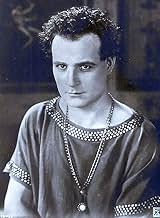IMDb RATING
6.3/10
48
YOUR RATING
Epic, melodramatic and rather risque adaptation of the British novel about ancient Roman decadence, culminates in the eruption of a nearby volcano.Epic, melodramatic and rather risque adaptation of the British novel about ancient Roman decadence, culminates in the eruption of a nearby volcano.Epic, melodramatic and rather risque adaptation of the British novel about ancient Roman decadence, culminates in the eruption of a nearby volcano.
- Directors
- Writers
- All cast & crew
- Production, box office & more at IMDbPro
Storyline
Did you know
- TriviaAccording to the December 1, 1926 issue of Cinéa-Ciné pour tous, that film grossed more money in a week (from November 12 to 18) than any other at the Aubert Palace of Paris ever since the creation of the theater.
- Alternate versionsThere's a 1996 video version in Spain, cut to 56 minutes. It was an American version with a voice over narration and no intertitles. In the main title, the movie was presented as the 1913 version, including a credit of Mario Caserini as the producer.
- ConnectionsFeatured in Cinema Europe: The Other Hollywood (1995)
Featured review
The last of the great silent Italian epics, The Last Days of Pompeii is as lavish as anything produced by Hollywood at that time - only much, much raunchier. During an orgy in the house of the evil priest Arbaces, naked slave girls are served up (literally!) on platters decked with flowers. A nubile mummy rises out of her sarcophagus to do a striptease and bare-breasted sphinx statues come to life as her chorus line. In the gladiators' tavern, wildly effeminate men (kohl-dark eyelids and lipstick as thick as clotted blood) drool and bat their eyes over so much naked, muscular flesh. All in all, the most satisfyingly decadent Ancient Rome saga until Fellini Satyricon in 1968!
In between the orgies and the rampant homoeroticism, directors Amleto Palermi and Carmine Gallone stick close to the Victorian melodramatics of Bulwer-Lytton's novel. The blind flower girl Nydia (Maria Korda) loves the dumb but good-hearted hunk Glaucus (Victor Varconi) who prefers the demure and aristocratic Ione (Rina de Liguoro). Ione, alas, is lusted after by the villainous Arbaces (Bernhard Goetzke) who also has a close...er...friendship with her brother Apicedes. A gorgeous young ephebe who resembles an Aubrey Beardsley angel, Apicedes can find nothing better to do than convert to Christianity. The best way, apparently, to 'wash himself clean of sin.'
You can always spot the Christians in these movies. They're the un-photogenic ones - the ones with glum faces and no jewels. But piety is no guarantee of salvation once Mount Vesuvius finally blows its top. The Grand Finale incorporates newsreel footage of an real volcanic eruption - so we're treated to the anachronistic but wholly delightful sight of two cameramen in modern dress, scurrying down the slopes to escape the burning lava! We watch, well-pleased, as the opulent sets crumble into still-more-opulent ruins. No, they really don't make 'em like that anymore! Not that anybody these days would have the nerve.
In between the orgies and the rampant homoeroticism, directors Amleto Palermi and Carmine Gallone stick close to the Victorian melodramatics of Bulwer-Lytton's novel. The blind flower girl Nydia (Maria Korda) loves the dumb but good-hearted hunk Glaucus (Victor Varconi) who prefers the demure and aristocratic Ione (Rina de Liguoro). Ione, alas, is lusted after by the villainous Arbaces (Bernhard Goetzke) who also has a close...er...friendship with her brother Apicedes. A gorgeous young ephebe who resembles an Aubrey Beardsley angel, Apicedes can find nothing better to do than convert to Christianity. The best way, apparently, to 'wash himself clean of sin.'
You can always spot the Christians in these movies. They're the un-photogenic ones - the ones with glum faces and no jewels. But piety is no guarantee of salvation once Mount Vesuvius finally blows its top. The Grand Finale incorporates newsreel footage of an real volcanic eruption - so we're treated to the anachronistic but wholly delightful sight of two cameramen in modern dress, scurrying down the slopes to escape the burning lava! We watch, well-pleased, as the opulent sets crumble into still-more-opulent ruins. No, they really don't make 'em like that anymore! Not that anybody these days would have the nerve.
Details
- Release date
- Country of origin
- Language
- Also known as
- Poslednji dani Pompeje
- Production company
- See more company credits at IMDbPro
- Runtime3 hours 1 minute
- Color
- Sound mix
- Aspect ratio
- 1.33 : 1
Contribute to this page
Suggest an edit or add missing content

Top Gap
By what name was The Last Days of Pompeii (1926) officially released in Canada in English?
Answer













